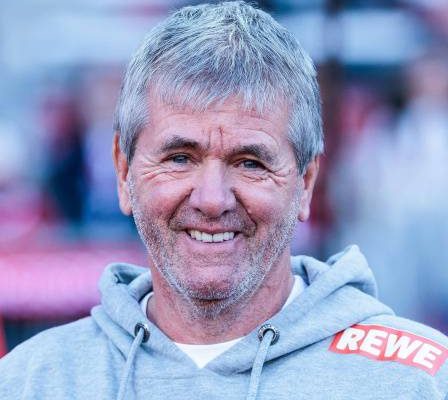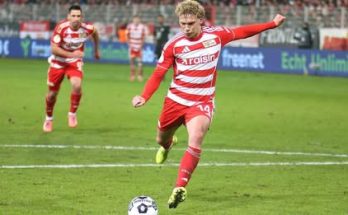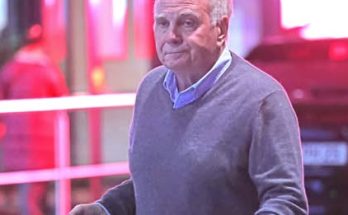A palpable unease has settled over the cathedral city, a collective holding of breath that seems to mute even the eternal flow of the Rhine. The news, when it broke, did so not with a shout, but with a somber, disbeliepering whisper that spread through the streets of Cologne and far beyond, into the very heart of German football: Friedhelm Funkel, the very embodiment of kölscher Kampfgeist, has been hospitalized with a serious illness. The message, stark in its simplicity, carried a weight that fans of the 1. FC Köln, and indeed anyone who holds football as more than mere sport, felt immediately. It was a jarring, dissonant note in the familiar soundtrack of the club’s enduring saga, a reminder of the fragility that underpins even the most stalwart of figures.
The image of Friedhelm Funkel is not one of flashy trophies or celebrity glamour, though his record as the most successful German coach in Bundesliga history by matches managed speaks to a profound and enduring competence. No, his image is something deeper, more visceral, and intrinsically tied to the soul of 1. FC Köln. It is the image of a man on the touchline, his face a weather-beaten map of a thousand battles, etched with the tension and passion of the moment. It is the sight of him, sleeves rolled up, his expression a mixture of gritty determination and paternal concern, a mirror reflecting the hopes and fears of the 50,000 souls in the Müngersdorfer Stadion. He is not just a coach; he is a Zugführer, a train driver, a mechanic of morale, a firefighter, and a father confessor. He is, in his very essence, a symbol of the fight.
This is why the concern is not merely professional or sporting; it is profoundly personal. Funkel’s legacy at Köln is not defined by a single championship won in a blaze of glory, but by something perhaps more meaningful: salvation. His return to the club in 2019, in its hour of dire need, was the stuff of legend. The club was adrift, sinking towards the abyss of the second division, its spirit broken. The call went out to Funkel, the old master, the man who understood the fabric of the club and its unique, often tumultuous, relationship with its city. He answered, not as a saviour on a white horse, but as a seasoned ship captain coming to steady a vessel in a storm. And steady it he did. With a combination of tactical pragmatism and an unparalleled ability to forge a unit greater than the sum of its parts, he orchestrated a great escape that felt less like a sporting achievement and more like an act of communal deliverance. In that moment, Friedhelm Funkel ceased to be just a former coach and became a permanent part of the club’s living mythology, a testament to the power of identity and fight.
It is this history that gives the current outpouring of solidarity its profound emotional resonance. The candles, the banners, the countless messages flooding social media are not the generic well-wishes offered to a public figure. They are the heartfelt utterances of a community speaking to one of its own. To see the scarves and candles laid at the feet of the Billy Goats statue outside the stadium is to witness a secular vigil. Each flickering flame is a silent prayer, a small, defiant light against the looming shadow of uncertainty. The banners unfurled at training sessions, bearing messages like “Kämpfe, Friedhelm!” (“Fight, Friedhelm!”) or “Stark wie Du, wir sind bei Dir” (“Strong like you, we are with you”), are not mere slogans. They are a covenant, a promise that the fighter does not fight alone. They are echoing back to him the very same spirit he has so often instilled in them and their team.
This solidarity extends far beyond the fanbase. It flows from his Weggefährten, his companions along the way. Former players, rival coaches, and officials from across the Bundesliga have voiced their support. This is a testament to the man behind the myth. In the often cutthroat world of professional football, Friedhelm Funkel has maintained a reputation for integrity, for a no-nonsense honesty, and for a deep, abiding humanity. He is a raconteur, a man with a story for every occasion, his wit as sharp as his tactical mind. He is remembered not only for his professional acumen but for his kindness, his loyalty, and his unwavering sense of perspective. The football world is not mourning a distant icon; it is worrying for a friend, a colleague, a respected elder statesman whose presence has been a constant, reassuring fixture for decades.
And so, Friedhelm Funkel, the symbol of kölscher Kampfgeist, now stands at the most challenging and personal battle of his long life. The touchline, for so long his stage, is empty. The roar of the crowd is replaced by the quiet, clinical hum of a hospital room. The tactical board and the team sheet have been set aside. This is a match where formations and substitutions hold no power, a contest fought not on grass but in the silent, intimate arena of the human body and spirit. Yet, one cannot help but feel that the qualities that defined his professional life are the very weapons he must now deploy. The same gritty determination that saw him guide teams through relegation dogfights, the same resilience that allowed him to weather the storms of managerial pressure, the same profound, unshakeable will that he so famously demanded from his players—these are now his frontline soldiers.
The 1. FC Köln, the club he loves, now faces its own challenge: to navigate the remainder of its season under the cloud of this sobering news. Every pass, every tackle, every goal will now be imbued with a new meaning. The players will run onto the pitch carrying not just their own ambitions, but the hopes of an entire community for their legendary coach. It is conceivable that his fight could become their inspiration, a powerful, if unspoken, motivation to embody the very spirit he represents. To fight for every ball, to never give up, to show the same heart that Funkel is now showing in his private struggle—this could be the ultimate tribute.
The story of Friedhelm Funkel and the 1. FC Köln is a tapestry woven with threads of joy and despair, of great escapes and painful defeats. It is a story that underscores the deep, symbiotic relationship between a club, a city, and the individuals who become living symbols of its identity. Football, in its purest form, is a vessel for these shared emotions, a canvas upon which a community paints its hopes, its fears, and its character. The current situation is a poignant, painful chapter in this ongoing story, a stark reminder that the giants who walk among us are human, vulnerable.
But if there is one thing that the life and career of Friedhelm Funkel teaches, it is the power of the fight. The city of Cologne, its famous cathedral standing as a monument to perseverance through centuries, now stands with its son. The candles will continue to flicker, the messages of support will continue to flow, and the chant of “Fight, Friedhelm!” will echo, silent but deafening, from the stands of the Müngersdorfer Stadion to his hospital room. The battle is his to fight, but he does not face it alone. The entire world of German football, led by the heart of Cologne, is standing on the sidelines, willing their champion, their fighter, their symbol of unyielding spirit, to once again secure the most important victory of all.



